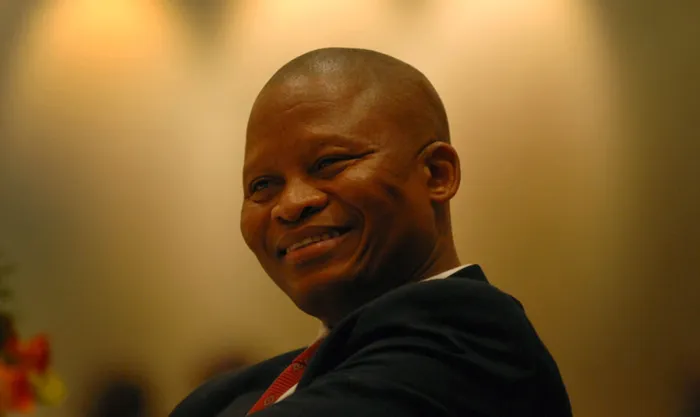Mogoeng’s baptism of fire

Leila Samodien, Omphitlhetse Mooki and Mercury Reporter
Mogoeng Mogoeng was one step closer to becoming the new chief justice yesterday after 16 of the 23-member Judicial Service Commission voted in his favour, following a marathon two-day public interview.
The JSC chairman, Deputy Chief Justice Dikgang Moseneke, is expected to tell President Jacob Zuma in writing today of the decision.
In terms of the constitution, not only must Zuma consult the JSC, but also leaders of the political parties in the National Assembly. DA leader Helen Zille has requested a meeting with the president and has yet to forward her party’s submission.
While Zuma must take their views into consideration, in terms of the constitution he does not have to agree with them and it is likely that 50-year-old Justice Mogoeng will be appointed the top judge to succeed his mentor, Sandile Ngcobo.
It was not clear, given the vehement criticism from civil society, Cosatu and the legal community, whether there would be a legal challenge against the nomination.
Also unclear is whether Justice Moseneke – who has repeatedly been overlooked as chief justice – plans to stay on the Bench. The palpable tension between him and Justice Mogoeng turned the live broadcast of the two-day hearing into a riveting affair.
Justice Moseneke raised Justice Mogoeng’s ire on Saturday by pointing out that a “chief justice is the intellectual leader of the judiciary. The visionary... flag-bearer to provide leadership that not only has experience but that has deep intellect in order to uphold our constitution”.
This was viewed by some as Justice Moseneke’s attempt to attack Justice Mogoeng’s constant statements that he had more experience than most of his colleagues in the Concourt.
Jutice Mogoeng replied: “I think it’ll be surprising that a Concourt judge will be intellectually lacking.”
There was more tit for tat, including Jutice Mogoeng losing his cool and telling Justice Moseneke not to be sarcastic. He later apologised.
The tiff continued yesterday, when Justice Moseneke quizzed Justice Mogoeng over why he had not consulted all the available legal authorities when he wrote a rape appeal judgment seven years ago.
Justice Mogoeng took his own swipe at Justice Moseneke, saying that while he was pleased with the JSC’s procedures, he would be “more restrained as a chairperson”.
It was left to JSC spokesman Dumisa Ntsebeza SC to make an impassioned plea to the two, who both have a black consciousness background – Justice Moseneke from the PAC and Justice Mogoeng from Azapo – not to allow the media and others to try to divide.
“In the PAC we used to serve, suffer and sacrifice. The deputy chief justice said he doesn’t have to be chief justice to serve this country. It disturbs me that you (Justice Mogoeng) and the deputy chief justice are being played against each other.”
He repeated that his preferred candidate had been Justice Moseneke as contained in his leaked e-mail to his executive in Advocates for Transformation. In the correspondence he said while this was the case, he believed it was the president’s prerogative to nominate whom he pleased and he would back Justice Mogoeng as a result.
Responding to a question about his relationship with Justice Moseneke, Justice Mogoeng said: “We relate strictly as colleagues. He’s the person I admired as a boy. I’ve always admired his courage. I look up to him as an older brother... not a friend.” In his closing remarks he reached out to his detractors including Justice Moseneke.
Although the ballot was a secret one, the fault lines that appeared suggest that the commissioners who voted against Justice Mogoeng probably included: Justice Moseneke, another JSC spokesman, CP Fourie, opposition MPs Nick Koornhof, Koos van der Merwe and Hendrik Schmidt, advocate Izak Smuts, and academic Engela Schlemmer.
It also emerged that he had told a colleague “in confidence” about his conversation with God and this had spread. “You told your colleagues that God wants you to be chief justice? Do you believe God wants you to be chief justice?” asked Van der Merwe. Justice Mogoeng replied: “I believe so. I’m one of those people who believes there’s a God, and God speaks. When a position like this comes, I pray and listen…”
These deep-rooted Christian beliefs saw him come under scathing attack recently, and similar questions about whether he would be able to live by constitutional principles that clash with the Bible came in the interview.
Van der Merwe maintained Justice Mogoeng was not the best man for the job: “Exercise the Ngcobo option; walk away, let things calm down, then maybe you can become chief justice… You’re only 51 (sic).”
But Justice Mogoeng, an ordained pastor, appeared bold and confident as the panel pressed him on everything from his views on religion, homosexuality and rape, to his regard for the independence of the judiciary, his judicial ethics and relationship with Zuma. Justice Mogoeng denied suggestions that he was homophobic and said women were “close to (his) heart”... he had two daughters and a wife.
While he welcomed civil society organisations making submissions, he said they had not presented a balanced view to the public. He believed very few, if any, other judges or magistrates would have survived the intense pressure he had endured .
He reassured people that he was committed to upholding the constitution and ensuring that the rights of all were protected and also came out in favour of press freedom.
“I particularly want to assure the women of our country and the gay and lesbian community that their constitutional rights would be safe.”
8 P2,6&7
